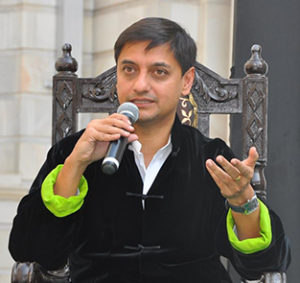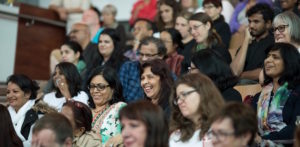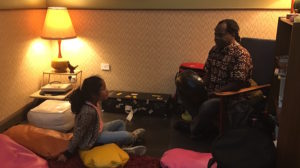Sanjeev Sanyal, Supriya Singh with Sampura Chatterji’s poetry and rapper Sofia Ashraf the highlight at JLF Melbourne
By Anu Jose
Beating Sydney to hold the inaugural Jaipur Literature Festival (JPL) was a treat for Melbournites as they soaked up two days of debate, discussion and entertainment from some of India and Australia’s best writers, artists and thought leaders. The migrant experience, women’s writing, state of India, the colonisation experience, transgender issues were some of the topics explored over the two days. All events were free, making it an accessible festival for everybody.
The opening gala kicked off the weekend with best-selling writer, leading world economist and environmentalist Sanjeev Sanyal exploring the state of India, in particular urbanisation, the Delhi experience and how it is impacting a new middle class, the economy and culture. He predicts urbanisation to be the biggest human event of the 21st century. A last minute addition to the festival after Sashi Tharoor withdrew, Sanyal didn’t disappoint. Audiences were also entertained by young rapper and activist Sofia Ashraf from Tamil Nadu. Growing up in a conservative family where religion was forced upon her she performed a rap which contrasts her experience, seeing the beauty of religion when it is welcomed into the home. Other subject areas close to Ashraf’s heart are corporate negligence from companies including Unilever and the Bhopal gas disaster. Passionate about music, she was excited about exploring the Melbourne music scene on her first visit to the city.
Poet Sampura Chatterji delighted everyone with the beautiful delivery of her poetry. The evening ended with great anticipation for the next day’s sessions which did not disappoint. While the adults were being educated, forced to challenge their current thinking by some brilliant minds, the young aspiring writers listened to an Indigenous and South African story teller plus had the opportunity to make their own little books.
The stand out sessions on Sunday were ”˜Weaving women’s narratives’ and ”˜Present tense: way of the World’. Namita Gokhale and Rakhshanda Jalil imparted their wisdom and thoughts on female writers and the importance of a good narrative. They were joined by locals Michelle Cahill and Natalie Kon-yu. All four acknowledged that women are forced to try harder to become good writers. The vital role translation plays was explored as it is through translation that many Indian women’s stories get widely read. These stories give us a sense of women’s lives, often poor, illiterate women at the same time teaching us important lessons of courage and pulling people out of equality. Gokhale argued that women should write with confidence and a good story is a good story regardless of gender. Female writers of the 1930s and 40s were discussed and how forward thinking and courageous many of these women were in their writing.
Rafael Epstein, George Megalogenis, Suvendini Perera, Sanjeev Sanyal and Supriya Singh were on the panel for ”˜Present tense: way of the world’. These highly intelligent individuals provided insight and forced you to challenge your own beliefs. Questioning if colonialisation was good for India, Sanyal did not hold back, giving us an emphatic no. He went on to say it was a disaster and a horrifying experience for Indians with 3 million dying from famine when Churchhill withdrew food. Millions also died from the massacres. Sanyal said it is absurd for us to talk about the British giving India the railways given the aftermath of everything that happened. The British want us to believe he said, that they left with grace and Indian history tells us it was a peaceful, unarmed struggle when in fact it was the armed forces revolting that drove independence. Not the congress party! This is contrary to Indian Independence Day celebrations.
The discussion turned to the Australian migrant experience. Megalogenis explained the racism each settled migrant group shows the new wave of migrants. This needs to stop and the way forward is telling the migrant experience through stories, what each group has been through and not repeating it. In talking of the migrant experience, discussion inevitably turns to split identity and the sense of belonging nowhere for some people. Sanyal, confidant in his ”˜Indianness’ said even though he has lived outside of India for 25 years he will always say he is an Indian and feels no conflict. It was this Indian, leaving Melbourne to start a new role in India as economic adviser to the Indian government. Sanyal was definitely the festival highlight and time will tell the impact he has in his new role. The world, he went on to say is a complicated place and we can’t get too rigid about how we deal with things in the world. Good advice for policy makers and those with the authority to make decisions impacting people’s lives.
All in all, a fabulous inaugural festival and one for Melbournians to mark in their calendars.
Short URL: https://indiandownunder.com.au/?p=8543



